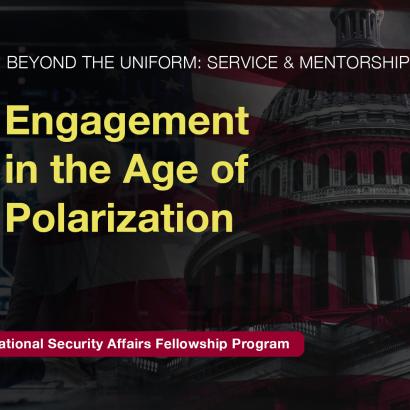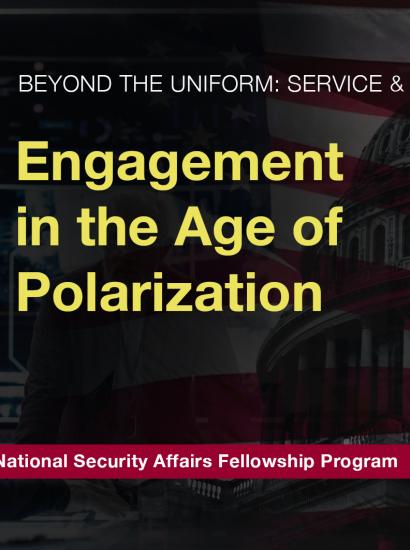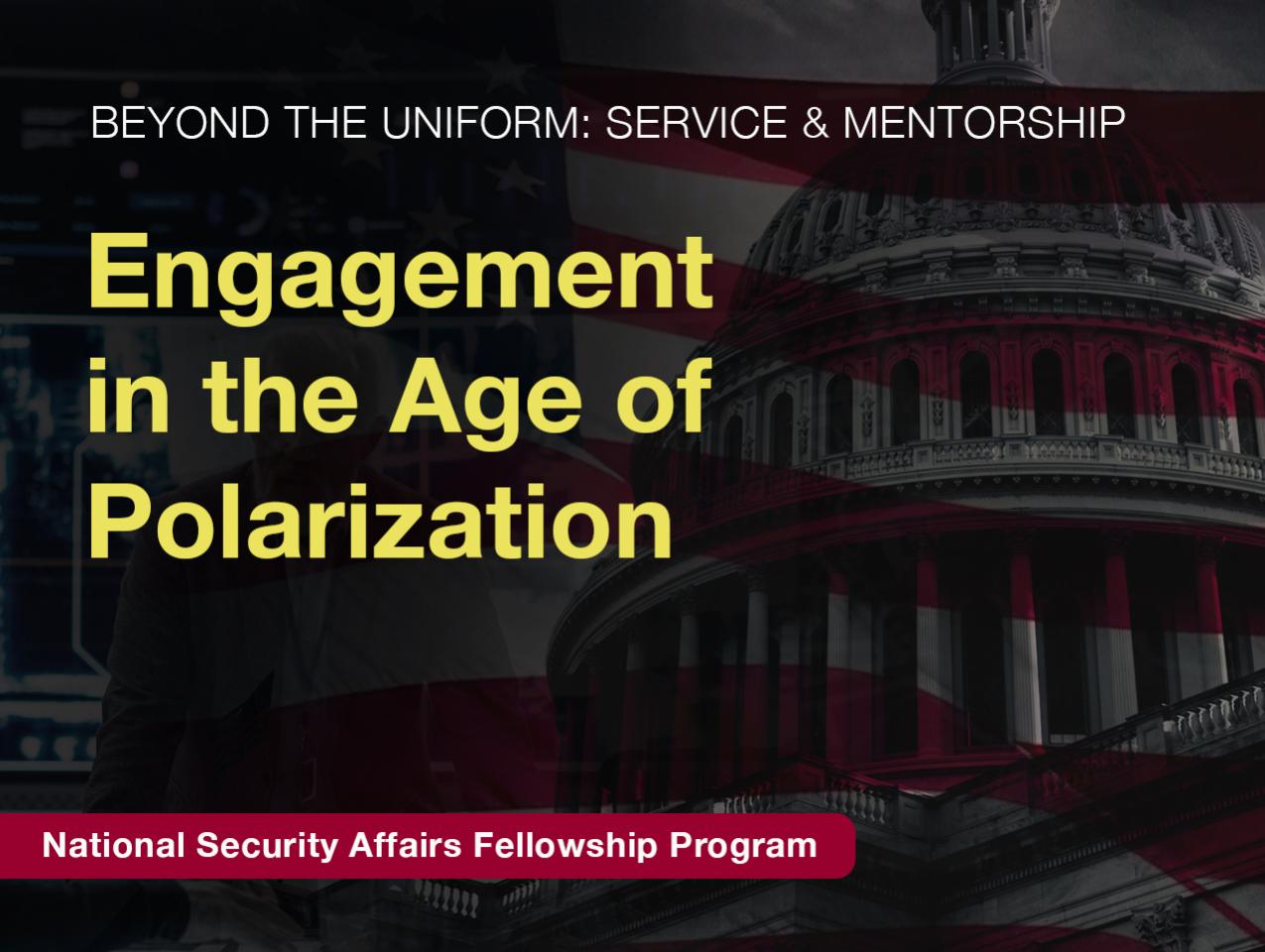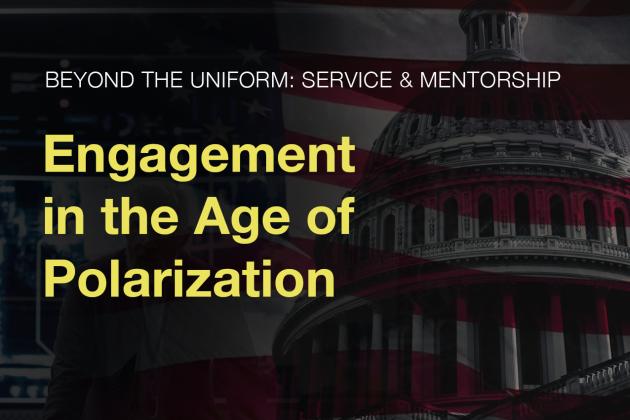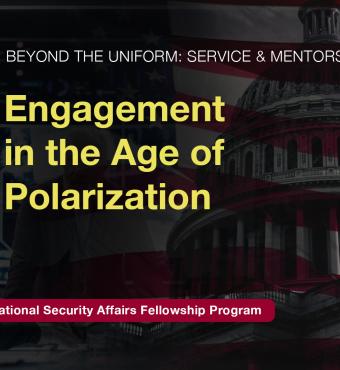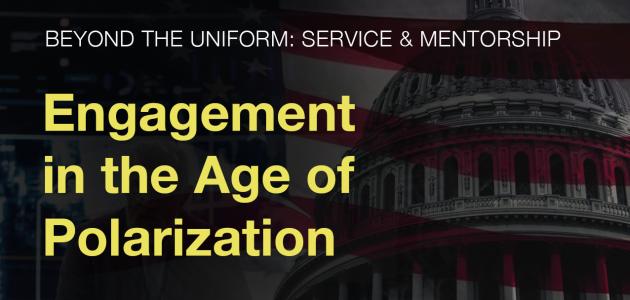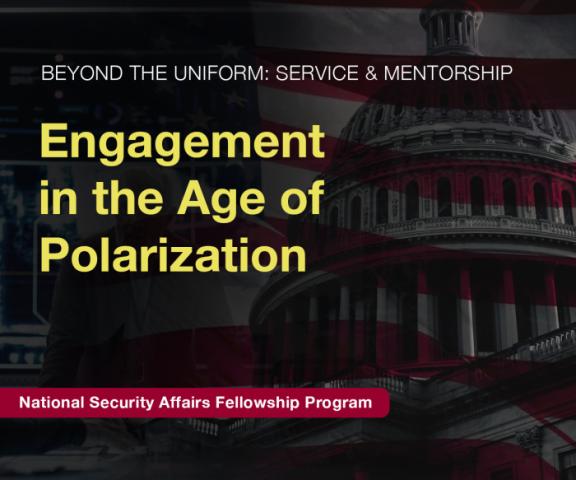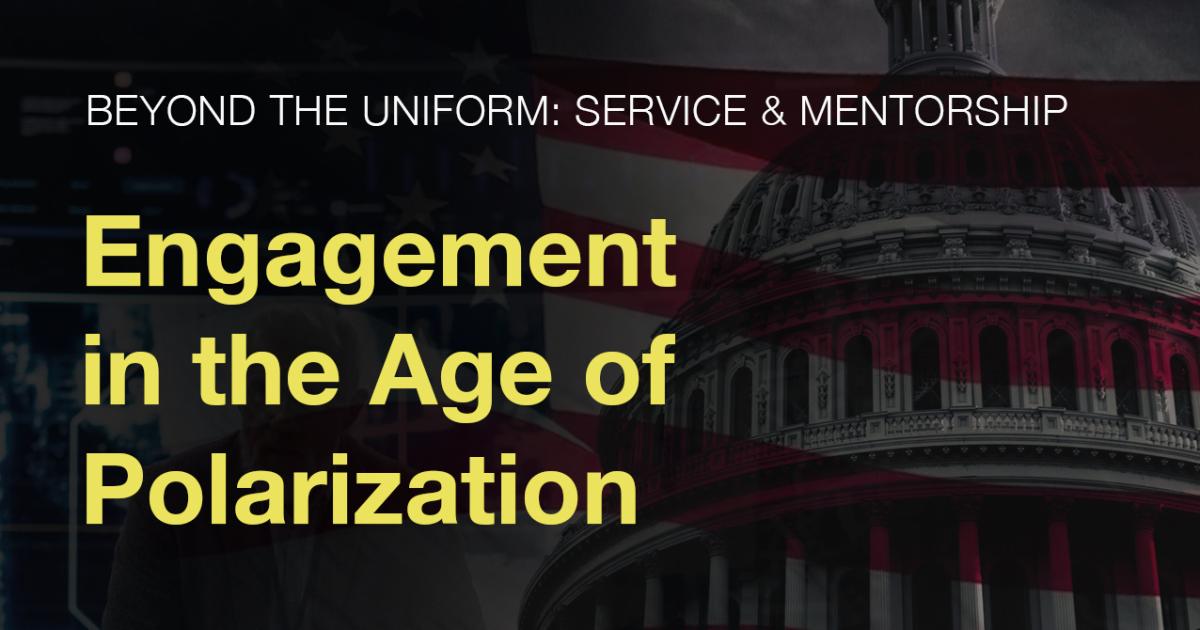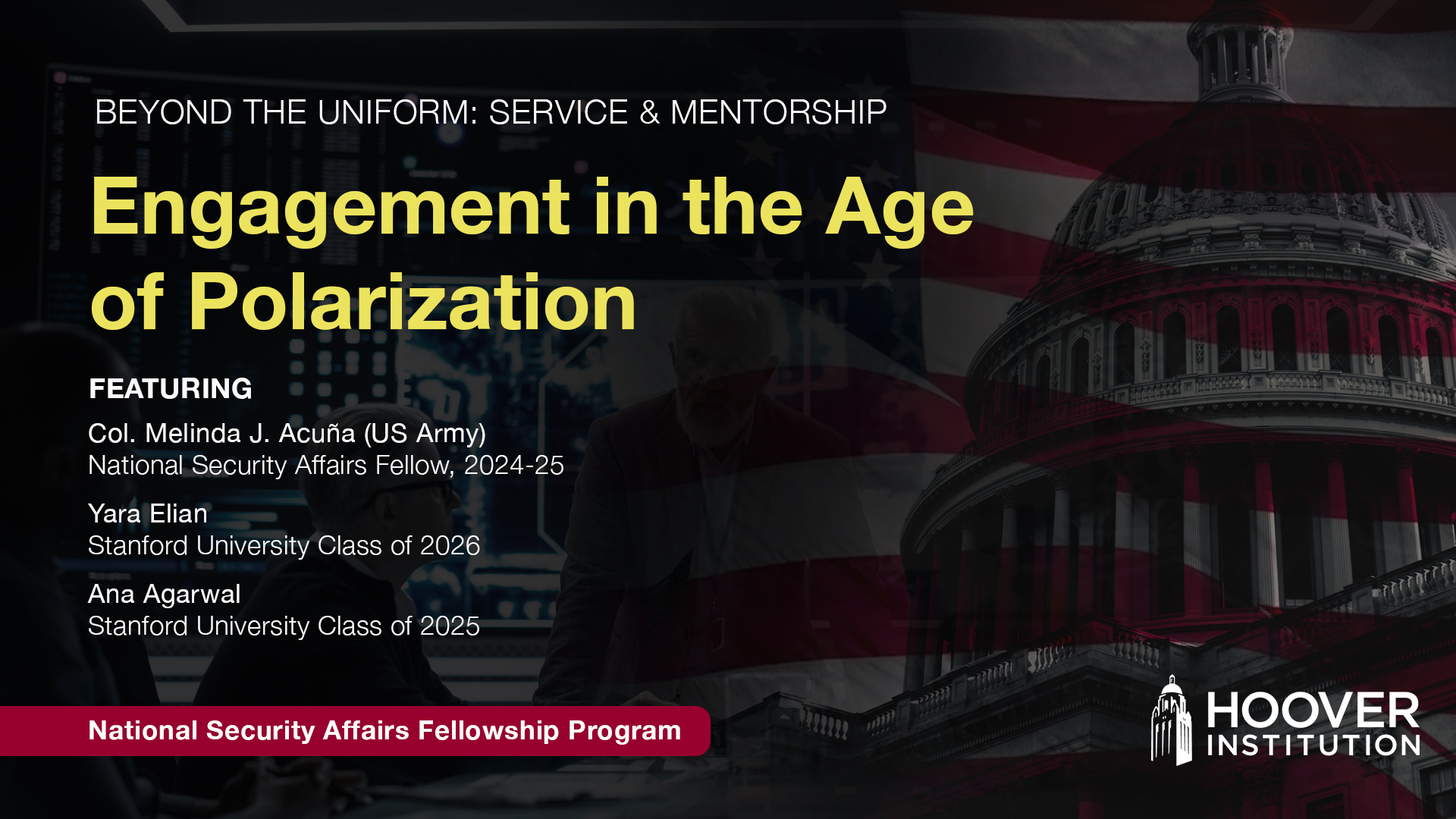In an increasingly polarized world, Stanford University Students Yara Elian and Ana Agarwal discuss with Colonel Melinda Acuña (US Army) the dangers of division and how essential it is to our society to engage with one another especially when we disagree.
WATCH THE VIDEO
>> Yara Elian: Hi, my name is Yara Elian. I'm 22 years old. I'm a junior at Stanford studying international relations with a specialization in international security and economic development. This year, I had a chance to be a part of the Hoover NSAP program, which I was really excited about because, fun fact, I applied to this program two times before.
So being a part of it this year was super exciting. And basically, the program is a cohort of about 24 students, I think, and 10 mentors who span across all types of national security fields, like military personnel. And then we also have State Department, FBI, CIA. And each mentor gets about three students.
And throughout the year, we get together as a cohort for some class periods. And then sometimes we get together in our small mentor groups to get to know each other, talk about politics, policy, what's going on today and what we think about it. So My mentor was Mr. Steve Goldrub.
He worked for the State Department. He was a Foreign Service officer or is a foreign Service officer. And his specialization was with China. So he took lead in a team that focused on China relations. And throughout the year, I feel like we built a pretty strong bond. We text each other, we get coffee.
We also went to Topgolf one time with Mr. Morabito or Mr. Morbido's group, which was great. And I have definitely learned a lot from Mr. Goldrup, especially as someone who has always been interested in doing Foreign Service, potentially as a career. And I just really enjoyed learning from him, learning more about China and the current dialogue and negotiations between China and the United States.
I think the two things that I learned from Steve that is actually kind of like a life lesson is one to take notes on everything. Mr. Goldrup takes a lot of notes. I see him taking notes in class. I see him taking notes in, like, our conversations. One time, I asked him to help me with an assignment for a class.
And basically what the assignment was was I had to interview him about a negotiation that he had. And he came with a whole page of notes about his story and what he was going to share. He's just always so prepared, and by taking these notes, you know that he's always listening.
And he likes to keep this and as a reminder and kind of bring it up next time in a conversation, which I really, really like about him. And that's what I've kind of took into my daily life. And another thing is that he asks a lot of questions.
He. Every day he has new questions to ask me, whether it's, you know, my academic life or my Sports life as a student athlete here, and I just really appreciate that. And also, he's not afraid to ask questions that people may not agree with because he's someone that really wants to learn.
So I think he really made me want to put myself out there a little bit more and not be as afraid of asking questions that maybe people might not want to hear. But it's generally, you know, it comes from deep inside of just curiosity and wanting to learn.
Two things that I learned from my mentor this year that are more kind of personal things is one thing I notice is that he takes a lot of notes. So whether it's in class, when we're having our separate meetings at Koopa Cafe, he's always writing down notes, always prepared to talk about something and have something on his mind.
One time I needed help with an interview assignment for a class, and I asked him to be my interviewee. And when we met up for the interview, he came with a whole sheet of notes that he had to share about. And it was just really special to know that someone is very genuine and really wants to know about you and learn about what's going on, despite being someone who works in the State Department and has so much knowledge already.
Public service. And the other thing about him is that he asks a lot of questions, which inspired me to ask questions that I usually wouldn't ask or shy away from. He is never nervous to ask a question that the rest of the group may disagree with just because he is genuinely curious to learn and maybe have his opinion kind of wavered, you know, coming out of a conversation with a different mindset than he had going in.
So, yeah, those are the two. There's a lot of things I learned from Mr. Goldrup, but I think those are the two things that I also would like to integrate into my own life. I think what was really valuable and special by having a mentor like Steve this year for the Hoover NSAT program was having someone with such a reputation and such a high position as a foreign service officer, and some of that work has worked in the State Department, be so attentive and interested in learning about a student like me who is just navigating through life and trying to figure out what they're trying to do after college.
So it was. It was really special and really made him human to me, because otherwise, you know, the government is such a picture in our head that we don't really get a chance to have firsthand experience from unless we get a career in government. So I think that was really special.
Connecting with someone who has so much experience, has such a reputation in an official position where they make really big decisions, I think that was very valuable in this program coming, I guess coming out of this. One thing I learned, as I mentioned before, my relationship with Steve made me see him as, you know, he's also an individual, also a person going through life.
And I think that is something that I also experienced with all the other mentors through your story times. And you know, the mentor swaps is that as we're having this experience with you guys and learning about national security and policy making and things like that, you guys are also going through life and experiencing your own things outside of the classroom.
And. And like with your story time that you shared with us, it just was so genuine and reinforced that you are, you know, people too, going through everything as we are, which I thought was really special, especially that you got to share it with us. I don't want to speak on behalf of all students, but I think I can say that generally we see military personnel and State Department, FVICA as these very high ranked official people with duties to serve.
And other than, you know, watching videos and occasionally seeing veterans on the street and saying thank you for your service, I've never really got to interact one on one so much with officials who have such big duties in protecting and serving our country. Yeah, yeah. This program definitely had a human humanizing effect for me personally and I think for lots of the other students too, because we see you guys as these very official figures who are courageously protecting and serving our country.
And that's not like a day to day thing that we get to experience. So the fact that we have a whole year to connect with you guys, not only with our mentors, but through mentor swaps, we get to connect with other mentors as well. It was just really special to see you guys as you are experiencing daily life, not currently in active duty, but just, still serving, just not currently deployed or in active duty.
So that was really special to get to experience a year of your life with you guys. One thing that I learned about national security and this national security decision making, to be specific, that I did not really realize before. And I think that many other Americans wouldn't realize, is how grueling it can be sometimes and how hard of a decision it can be morally and ethically.
But sometimes it just has to be done in order to protect your country and defend the United States of America. For example, Colonel Greco's story about how he had to make the decision, his decision while being in the Middle east, and how hard of a decision that was to make, and other stories that the other mentors have shared.
It just shows that it just doesn't happen like that. And it takes a lot mentally to be able to carry out a decision that you have to do.
>> LTC Melinda J. Acuña: And then what surprised you?
>> Yara Elian: Mr. Goldrup shared a story in class about a. When he was deployed in China for a foreign service officer position, and he had to do a negotiation with a priest at a Chinese church for President Bush to speak at.
And it had a lot of sentimental value to it, but I think something that he had to deal with that was interesting to me was being able to navigate through the language barrier. Also having to deal with a government that was not something that he was used to.
And working around it, making sure that not only he is safe, but also the person that he's negotiating with is safe, is fine, especially with the Chinese government. So him being able to navigate through all of that and execute something that actually took so much. There were so many little details that I would have never thought were very big, but they ended up being very, very huge, was really interesting to me.
And made me rethink about how much the little details and paying attention to those little details matter, especially when dealing with a negotiation. Through the mentors, I have learned a lot about what it means to be an effective leader and what it means to lead a team through any situation, no matter if you yourself are scared and don't want to do it.
You have such a huge weight on your back to uphold. It is hard, and it's definitely taught me a lot about leading my own team, even though it's very small and not the same, leading a team of athletes as a synchronized swimmer. You guys showed me what it means to really be there for each and every single person.
Like, for example, Gardner was telling us a story about how he was in charge of someone who lost a rifle. And he told the entire team to go back because they had to retrieve the rifle. It was part of the military equipment, and they couldn't just leave it there.
And as a leader, he encouraged everybody to just push through it, go back because of how important it was, and stay positive while doing it. So I think just little things like that that I've learned through story times and outside of class, through other stories that you've shared has really shaped my own view on what it means to be a leader and the impact that I want to make in the future.
This program has definitely realigned my view on what I want to do as I entered the workforce, which is work in public service. Entering Stanford, I already knew that I wanted to study international relations. I've always kind of known. I've been a big history geek. I love learning foreign languages.
I loved learning about politics and keeping up with politics. So international relations was always something that I wanted to do at Stanford. I think being kind of in this bubble for most of the year, you get a little bit caught up in the flow. And I definitely think that as I spent more time here, started thinking, maybe I should try something else, which is great.
It's great to try new things. But I was trying things that I knew deep down that I wasn't very passionate about. So coming into this program junior year and hearing from the mentors, learning from them, definitely. Reinforced my original path and motivation and passion to pursue international relations, public service, and just really keep giving back to the community.
As I graduate college, as we wrap up the program or the 2024, 2025 program. I think one really big thing that I learned is to really listen to both sides and evaluate and be able to learn and see the perspective of someone that you may disagree with. Because even from mentors and students, I came into a lot of the discussions thinking one way, because I think being raised in California, this is a very Democratic.
I think we all relatively think the same way. And being able to, throughout the quarter, to be kind of swayed and thinking, okay, that's a very good point. And I see where this is coming from, and I see why this policy was created, even though I personally, when I read it in the news or saw it elsewhere, disagreed with it right off the bat.
I think that was really cool to be able to become more even more open-minded. I would say I was always pretty open minded, but becoming even more open minded and taking that all in and being able to kind of create an even more deep and knowledgeable opinion on things that otherwise.
I would have just thought of one way and kept on with it. And I think that's very important in public service as well. Working in government, in the military, even though it's apolitical. One particular story that I wanted to share that I thought was super special and also reinforced my perception of you guys as more of just humans.
And like us on a certain level was when I went to Topgolf with Mr. Goldrup and Morabito. And first of all, Mr. Morabito brought his friends, or I'm sorry, let me restart. It wasn't his friends, it was his kids. Okay, one really special event that I experienced during the program was when Mr. Goldrup and Mr. Morabito took us, our students that they were mentoring, to talk TOPGOLF for an evening.
Marabito brought his kids with him, which was super special, and I got to chat With them and get to know them and also ask them some more questions that I wasn't able to ask. When they came to class that one day I, after that I just got more of a, you know, feeling and understanding of what it's like to be a kid going through all of this and growing up and having to experience a family member being deployed or being in active duty so they don't see them for a long time or having to move constantly from place to place.
And then afterwards when we went to go drop them off, we got to go to the base camp that you are also staying at, which was very special. And it also gave me this eye opening experience of, you know, how you have to settle and call a new place home.
I've lived in my house for about 10 years now since the last I moved and I've had enough time to really call that place my home. By having to move with your family to a new location, settle in, try to get involved in the community, get to know the people around you, it's really, really difficult.
And that is something that I applaud all of you for because doing that for multiple years on end is really difficult, and I really praise you for that.
>> Ana Agarwal: Hi, I'm Anna Agarwal. I'm a senior at Stanford and I'm majoring in International Relations. This year I've had the opportunity to be a participant in the Hoover mentorship program and my mentor has been Colonel Jerome Greco in the Marine Corps.
And I have two other Hoover participants in my group as well. And through this experience I've really gotten to learn what it's like to fight on the front lines. Colonel Greco has been deployed to the Middle east multiple times and I've never really gotten the opportunity to talk with someone who has been put in that position making these types of on the spot decisions that can affect people's lives.
And so I've really had, I've really enjoyed the opportunity to broaden my own perspective by talking to him, but also by getting the opportunity to show him what it's like to be a Stanford student. And I really appreciated his openness to learning about our lives as well. I think my relationship with Colonel Greco has definitely strengthened over the year.
You know, towards the beginning of the year it was more getting to know each other, hearing about each other's lives, both his in the military and mine here at Stanford. And then last quarter I really honed in on what my senior capstone was going to be for my international relations major.
And I'm researching why the United States has been so, so slow to integrate small, attritable drones into the military. And when I kind of mentioned my project to Colonel Greco offhand, he really became super excited about it and excited about helping me. And we've met multiple times to talk through my ideas.
He's been super patient about everything that I don't know, which is a lot, and also being very generous, connecting me to his colleagues and friends at the Defense Innovation Unit. And so I think that through this project I've had the opportunity to connect with Colonel Greco one on one, a lot more.
He sends me articles throughout the week and we text back and forth about our thoughts. And so I've really appreciated his willingness to kind of guide me through a lot of the unknowns that have surfaced throughout this project. And I've learned a lot about his experience with deploying drones on the ground as well, which has been super fascinating.
During one of our, I think it might have been our very first meeting, Colonel Greco shared a story about a split decision he had to make while he was on the ground in the Middle East. That was a life or death decision. And even though I knew, you know, subconsciously that military members were put in these types of situations day to day, hearing his story really solidified that for me and, and really clarified the tough positions that military members are put in every day for the sake of our national security.
And I was really struck by the thoughtfulness with which he shared that story and also his willingness to open up about something to a group of people that he had just met that very day. I really appreciated his ability to be candid in that moment and for the sake of our learning experience.
One of the most surprising things that I've learned in the Hoover program was how the military budget process works. For one of our sessions, Colonel Greco led us through a really in depth explanation of how funding gets approved through Congress. And I was really surprised by how far out the military actually has to plan in order to get all of the equipment they need and how that might be impacted by changes in innovation and technology and how they might be able to adjust their budgetary requests to those changing needs.
That was really surprising to me and I really appreciated that breakdown because I don't think a lot of Americans actually know the intricacies of that process. And I think it's really important to have that perspective. I think one of the most valuable things that I've taken away from my relationship with my mentor is our ability to engage in really tough conversations about pretty polarizing issues with respect for one another and curiosity.
I think one of the things our mentors have really impressed upon us is their need to be nonpartisan in their jobs. And that's really come across in how Colonel Greco has interacted with us. He's really open to having all sorts of conversations about a whole host of issues and is super honest with us.
And I think we're pretty open about where we stand politically. And he's super accepting of that and willing to engage in those conversations with us, even if he may not agree. Part of the Hoover program has really impacted the way that I think about my career after graduation.
I've worked in the private sector for all of my internships throughout college, and I plan to start in a job in the private sector after I graduate. But through my conversations with Colonel Greco and with other mentors in the program, it's really made me rethink my desire to give back and to contribute in the public sector at some point in my career.
And something that we've also talked about a lot is how it should be more normalized to switch between the private and public sector throughout one's career. And so that's definitely made the prospect of one day working in the public sector feel more attainable and that it's not all or nothing private or public sector one way or the other.
I think something that really surprised me to learn about national security decision making is how bureaucratic everything is and how much negotiation and back and forth goes into the decisions that are being made on a daily basis. I personally didn't really fully understand how much role Congress plays in national security decision making and the power that they hold in terms of allocating funding to the military.
And so even though from a civilian perspective, it can seem like these national security decisions are being made in a vacuum by, you know, mainly the executive branch, I think it's really thrown into perspective how much is really going on behind the scenes, how much back and forth there really is, and how many players are involved in every decision that we see in the news.
Yeah, I think this program has really impacted the way that I think about the civilian military relationship. I think they're much more integrated than I previously understood. And I think that's really important because, you know, if civilians are making decisions that the military has to execute in a vacuum without having.
Having that perspective from the military, there wouldn't be a lot of cohesion in the decisions that are being made. And I think something that we've talked a lot about as well is the importance of having private companies input also in those decision making, especially if it involves, you know, technological decisions or innovation.
And so I think making sure that perspectives are shared among both parties is really important to having as much information as possible in. In foreign policy decision making. I think something that's really stood out to me about how to make foreign policy decisions is the need to be able to work with a host of different people with different views.
Almost all of our speakers that have come in have impressed the importance of cultivating our allyships with allies that we've held for many years. And that's speakers of all different political backgrounds have touched on that. And so I think that in terms of, you know, being successful in making those types of decisions, it's important that our allies feel like they're part of the conversation and that, you know, you can get along with, with folks of all different beliefs to.
To get those decisions made. I think that this program has really impacted the way that I think about my career. After graduation, I'm going to be working in consulting after I graduate. And prior to participating in this program, I was thinking a lot more along the lines of consumer consulting, because that's what I have experience in and what I have been interested in the past.
And after having experience in this program, I'm a lot more excited about potentially consulting for the government or for defense technology organizations. And that's part of the reason why I decided to focus my senior capstone on defense technology, because I want to explore that interest before I graduate and help me decide if that's something I want to pursue longer term.
So I definitely think that I've broadened my horizons in terms of the areas that I want to focus on after I graduate. I think something that's really struck me over the course of the program is the way that the mentors and the mentees think about national security challenges differently.
We had one class where we all ranked what we thought our top challenges were. The students ranked them, and then the mentors ranked them. And while we agreed on some of the more obvious challenges, like China or AI, there were a few that were surprising to me. For example, the students really thought of polarization to be one of the main national security challenges, which is something I still kind of hold to be true in my mind.
Whereas mentors were more focused on education as a National Security Challenge and the military industrial complex. And I think having that experience, being in those military roles exposes you to different challenges that we, as students in our international relations classes, aren't necessarily exposed to. And so getting to hear from the mentors about what they believe to be the greatest national security challenges has really, you know, made me think more deeply about a host of different challenges I never would have considered before.
One of our class periods that really stuck out to me was when General Mattis came to speak to our class earlier this year. It was a very full circle moment for me because he came to speak to my class in the very first international relations class I ever took with Professor Zegart my freshman spring.
That inspired me to major in international relations. And something he said to our class this year really stuck out to me, which when asked when he was asked what our biggest national security challenge was, he commented that it was the way we treated one another. And I think that really speaks to what this Hoover program is really meant to foster, and that's conversation and discussion among people with different views and approaching those types of conversations with respect and curiosity.
And for me, that really encompassed, you know, my international relations education and my experience in the Hoover program. Sam.
ABOUT THE FELLOW & MENTEE
Lieutenant Colonel Melinda J. Acuña, representing the US Army, is a national security affairs fellow at the Hoover Institution for the academic year 2024–25. Acuña is a logistics officer and has served in variety of assignments in the United States, Europe, Middle East, and Indo-Pacific. She has also deployed to Iraq multiple times.
Yara Elian is a rising senior and student-athlete at Stanford University, majoring in International Relations with a focus on International Security and Economic Development. She competes in artistic swimming and helped lead Stanford to the 2023 U.S. Collegiate Championship (Team).
Ana Agarwal, Stanford University Class of 2025, graduated with a Bachelor of Arts in International Relations. She concentrated in International Security within her major, and her final capstone investigated why the Department of Defense has been slow to integrate small attritable drones into its military forces. Post grad, Ana will be joining McKinsey and Company in New York City.







